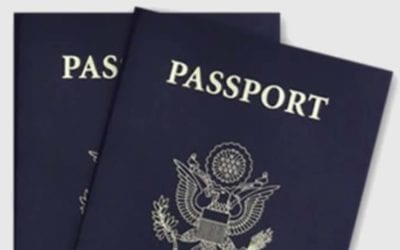
One of the most confusing areas of flying these days concerns the charges and rules for checked bags. The Department of Transportation (DOT) in its latest rulemaking moved to clarify the rules by mandating that the same baggage allowances and fees apply to a passenger throughout an itinerary that originates or ends in the U.S. The new rulemaking comes into effect on January 23, 2012 and airlines are scrambling.
In the case of a codeshare itinerary originating or ending in the U.S., the marketing carrier’s baggage allowances and fees must apply throughout the itinerary.
How did we get into this situation where consumers have no idea of what baggage rules apply to their flights even as airline alliances and code-sharing steadily grows?
Basically, the airlines have created a system to allow themselves to appear to offer a larger network of destinations without actually flying there by teaming up with other airlines. While airlines have to go through extensive reviews in order to actually merge, the requirements to set up a codeshare arrangement are far more expeditious.
The airlines claim that consumers benefit by seamless connections, common ticketing, better schedules and time saved. But, stating those goals in a plan and making them operationally doable are two far different things.
Basically, the consumer has been forgotten when it comes to the details of the codeshare and alliance operation. Airlines are reaping benefits, but consumers are confounded by confusing uncoordinated rules.
Even mergers blessed by the government face years of consumer disruption because of conflicting rules, battling labor unions, new executives and incompatible computer systems. Even simple issues such as what color to paint the aircraft and the time to paint each one cause delays, when seen from the outside. However, those consolidation problems, once surmounted, eventually allow two different carriers to morph into one over time.
But, in the case of a code-share operation with a foreign carrier or that of an airline alliance with antitrust immunity, the ability to merge operations and make them seamless for travelers borders on the impossible. Consumers end up faced with alliances and codeshares of a Frankenstein nature. Worse, in most cases, these alliances have several different computer systems or “brains.”
Stepping into this codeshare and alliance world that the airlines have created, DOT is taking its first baby steps at protecting consumers and bringing some sanity to airline baggage operations when it comes to flights marketed by carriers that shift between operational airlines within alliances and codesharing.
In other words, in today’s airline world a customer theoretically can purchase a ticket from Delta Airlines for a flight from New York to Paris, then onto Italy, with a return from Italy to the USA via Amsterdam. Though the ticket is sold by “Delta” with a “DL” code, none of the flights are operated by Delta.
New York to Paris may be on Air France. Paris to Venice might be on Alitalia. Venice to Amsterdam to New York would probably be on KLM. Not one single Delta flight, but every flight has a Delta flight number.
The question is, “Whose baggage policy applies to this flight?” Is it the Delta policy? The ticket is sold by Delta subject to their Contract of Carriage. Or, does the Air France policy apply since it was the initial carrier? Or, does the Alitalia policy apply from Paris to Venice, since there may have been a stopover in Paris? Or, does KLM’s policies apply since it is the “most significant carrier” on the itinerary?
Right now, the airlines make up the rules as they go. There is an IATA Resolution 302 that requires the baggage policies of the “most significant carrier” to apply if there is a conflict between the marketing and operating carrier. However, airlines themselves admit that they are struggling to follow that rule and determine which carrier the “most significant carrier” might be.
In comments filed with DOT airlines noted [I have added paragraphs and formatting to clarify the airline comment]:
——-
In almost all cases, carriers do not have the ability to access information on marketing carriers within check-in systems and also cannot readily access each other‟s fee schedules; indeed, no central repository for carrier baggage policies and fees currently exists.
Under the new rules, there are hundreds of carriers and hundreds of fee policies that each carrier must be able to access and charge. Each individual fee policy has many rules and conditions that change regularly and take into account external factors such as frequent flyer status and carrier credit card membership.
There is no comprehensive solution currently in place to exchange data between carriers about
(1) general allowances and fee levels;
(2) which customers qualify for special fees or exemptions, or;
(3) which passengers are elite-level, U.S. military, have subscribed and paid for an annual baggage program etc. This information would be needed in order to accurately tailor baggage prices by passenger.It will be extremely difficult for each individual carrier to build a solution that will account for hundreds of carrier policies and each set of conditions within each policy.
Carriers are working with partners to develop an industry solution to comply with the Department‟s new rule but this will take time.
——-
Wow! I’ll agree with the airlines on this one. It is complicated. But, what about the consumer? Should the airlines be allowed to place passengers under such a complicated arrangement, that even the airlines can’t figure out? Should consumers be left to random rules and regulations determination with no recourse?
The coming DOT rule will clarify this. The marketing carrier’s baggage rules will apply as far as DOT is concerned.
Will this solve airline consumers’ baggage fee problems and conflicts between various carriers’ baggage rules? Probably not.
Passengers may find themselves allowed to carry on a bag from New York to Paris and then find that they must check that same bag on an ongoing leg of their ticket. Perhaps there will be a charge to check the bag even though the passenger is traveling on a codeshare flight operated by an airline alliance partner. However, with this new DOT regulation in place, passengers can right the wrong after their travels.
After January 23, 2012, passengers will be able to write to the marketing carrier (send a copy of your complaint to DOT as well using their online form) and get any charges refunded and receive some kind of compensation for their troubles.
Those will be the new rules. Finally, consumers have some clarity.
What are your thoughts on the complexity of baggage charges these days across airlines both domestic and International?
Photo: Carry-on bags ©Leocha

Charlie Leocha is the President of Travelers United. He has been working in Washington, DC, for the past 14 years with Congress, the Department of Transportation, and industry stakeholders on travel issues. He was the first consumer representative to the Advisory Committee for Aviation Consumer Protections appointed by the Secretary of Transportation from 2012 through 2018.


